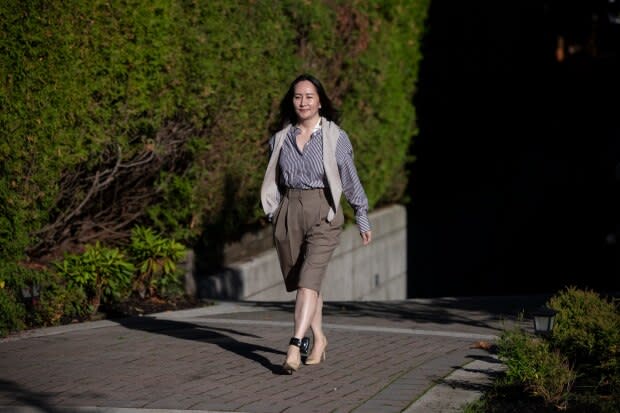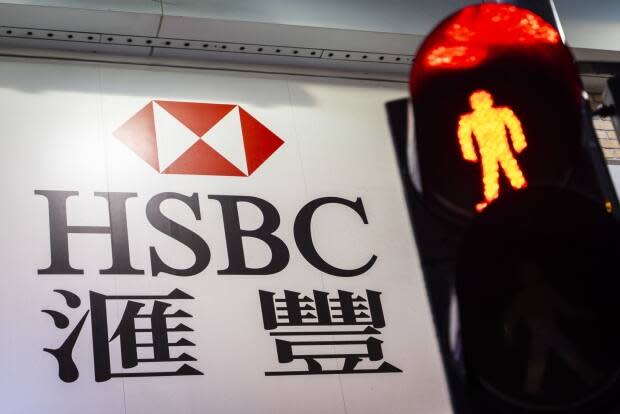Meng Wanzhou appears in court to argue U.S. misled Canada in extradition case
Meng Wanzhou made her first appearance in B.C. Supreme Court in months on Monday as her lawyers accused the United States of cherry-picking evidence to try to convince Canada to extradite her.
Defence lawyer Scott Fenton told Associate Chief Justice Heather Holmes the underlying record of the case filed against the Huawei executive was filled with omissions and misstatements.
Meng, 48, is accused of fraud and conspiracy to commit bank fraud.
Prosecutors claim that she used a PowerPoint presentation to lie to an HSBC executive about Huawei's control of a company that was accused of violating U.S. sanctions against Iran.
As a result, the bank allegedly put itself at risk of prosecution for breaching the same laws by continuing to process financial transactions for Huawei through the U.S. banking system.
But Fenton claimed that prosecutors left out two crucial slides from the presentation which established that Meng gave HSBC all the information the financial institution needed to keep out of trouble.
"This is really the elephant in the room," Fenton told the judge.
"She told them everything they needed to know to measure sanctions risk."
The hearing is only likely to last until Wednesday.
The arguments about the record of the case are one of three lines of attack the defence team is taking to try to scuttle the extradition proceedings against Meng, Huawei's chief financial officer.
Hearings have been set for February 2021 on the other two alleged abuses of process, which centre on politicization of the case and alleged violations of her rights at the time of arrest.

The purpose of this week's proceedings is as a kind of screening procedure for Holmes to decide if concerns about the evidence reach the same threshold for consideration or if the allegations are frivolous.
The proceeding happened in a vastly different courtroom from the last major hearing in the extradition proceedings, which was held last January, when Meng argued that the offence she is accused of would not be considered a crime in Canada.
She lost that argument, clearing a major hurdle toward extradition for the Crown.
Meng wore a light purple mask with the words "Made in Taiwan" printed at the bottom. Her hair is much longer than the last time she appeared in court, and she wore a striped shirt and long beige shorts which displayed the GPS monitoring ankle bracelet she wears as part of her bail conditions.
Meng was arrested at Vancouver's airport on Dec. 1, 2018 on what was supposed to be a stopover from Hong Kong to Mexico City.
'Not a runaway train motion'
The Crown will argue for a summary dismissal of the defence's application for a full hearing on the allegations about the underlying evidence. In extradition cases, the record of the case provided by a requesting state is usually held to be presumptively reliable.
But Fenton said that with that "shortcut" comes a duty for diligence, candour and accuracy.
"This is not a runaway train motion," he said, assuring Holmes that the allegations were serious enough to warrant a stay of proceedings.
"This is not going to delay, prolong or interfere with the schedule in any way."
Meng's lawyers claim senior executives at HSBC knew about Huawei's true relationship with SkyCom, not just "junior" employees, as described in the record of the case.
They say prosecutors failed to mention that HSBC didn't have to use the American banking system to clear financial transactions related to the companies — meaning no sanctions would be violated.

The defence team wants to enter as evidence an affidavit from John Bellinger, a former counsel to the George W. Bush White House, who claims the U.S. has never imposed civil or criminal penalties on a bank for breaking sanctions after being misled by a customer.
"Any assertion that Ms. Meng's alleged misrepresentations would have put the bank in legal jeopardy for sanctions violations is not supported by past U.S. government practice."
'Actual trial of evidence is not in question'
In court documents, Meng's lawyers point to a 2003 case in which a B.C. Supreme Court judge stayed proceedings when the United Kingdom sought a Victoria man for extradition in relation to an alleged conspiracy involving the sale of rare coins.
In that case, the man's defence determined that one of the chief witnesses had absconded, another had died, and prosecutors didn't actually know if another was available.
In granting a stay, the judge said it would be "unsafe" to rely on the record of the case.
"Where the conduct of a foreign certifying authority falls so far below and expected reasonable standard to amount to a complete failure of due diligence, this impacts on the fairness of the extradition process," wrote Justice Sunni Stromberg-Stein.
The Crown's reply to the defence arguments has yet to be released to the public.

But Vancouver-based lawyer Gary Botting, who wrote a book on Canadian extradition law, says he doesn't expect the defence to succeed.
Botting says courts have held that "the record of the case is presumptively reliable."
"Everything is aimed at seeing this as a pre-trial patent process that doesn't really result in a trial," he said. "So the actual trial of evidence is not in question."
If anything, Botting expects the Crown to buttress its case with new allegations contained in stories from Reuters this summer that claimed internal documents obtained by the news agency showed that Huawei had acted to cover up its relationship with SkyCom after Reuters first reported on the relationship between the two companies.
Meng has denied the allegations against her. A decision isn't expected on extradition until at least mid-2021.

